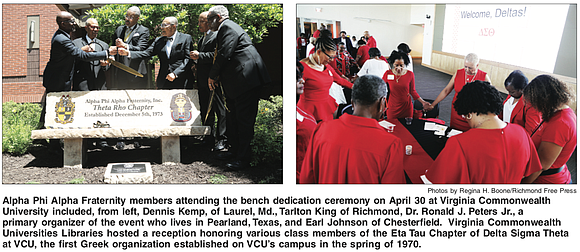Brotherhood, sisterhood and service
Free Press staff report | 5/4/2023, 6 p.m.
In his 2001 book, “The Divine Nine: The History of African American Fraternities and So- rorities,” author Lawrence C. Ross Jr. explains “the vital role of America’s Black fraternities and sororities,” which includes providing young black achievers with opportunities to support each other while they serve their communities and the nation.
“From pioneering work in the suffragette movement to extraordinary strides during the Civil Rights Movement to life-changing, inner-city mentoring programs, members of these organizations share a proud and vital history of brotherhood, sisterhood, and service, Mr. Ross, a member of Alpha Phi Alpha Fraternity, writes. Many well-known Black leaders such as Dr. Martin Luther King Jr., Thurgood Marshall and Dick Gregory (Alpha Phi Alpha), and Vice President Kamala Harris (Alpha Kappa Alpha) are members of the Divine Nine.
“Today, America’s nine black fraternities and sororities are almost 3 million members strong with chapters at major universities and colleges, including Stanford University, Howard University, and University of Chicago,” Mr. Ross wrote some 22 years ago.
Add several Virginia colleges and universities to that list, including Virginia Commonwealth University, which, on April 30, paid homage to two of its Black fraternities and sororities – the Theta Rho Chapter of Alpha Phi Alpha Fraternity and the Eta Tau Chapter of Delta Sigma Theta.
Along with Richmond Mayor Levar Stoney and Jay Davenport, VCU’s vice president for Development and Alumni Affairs, dozens of family members, friends and colleagues attended Alpha Phi Alpha’s 50th-year Bench Memorial Project ceremony at VCU’s Shafer Court. The program celebrated the unveiling of the Theta Rho Memorial Bench on Shafer Court at Virginia Commonwealth University, the first such memorial dedicated to Black Americans on VCU’s campus, said Dr. Ronald J. Peters Jr., a primary organizer of the event who joined his fraternity in 1987 and graduate from VCU in 1991.
Dr. Peters did not mince words in describing what many of VCU’s Black students endured in the university’s early days of desegregation.
“Richmond City School District was not desegregated until 1972, and many of our white student counterparts at the time were disinclined to amalgamate with us, their student peers, on campus,” he said in a press release announcing the bench ceremony.
“As Black students, our racially stratified social experience, as well as our daily ingestion of high dosages of public tributes to sociopolitical concepts of the Confederacy, had major effects on our mental health. This historical memorial dedicated to the Alpha Phi Alpha Fraternity Inc. will serve as a vicarious catalyst for promoting the construct of equality among our fellow alumni and students on campus for decades to come.”
Shortly before the Alpha’s ceremony, Virginia Commonwealth Universities Libraries hosted a reception honoring the Eta Tau Chapter of Delta Sigma Theta at VCU, the first Greek organization established on VCU’s campus in the spring of 1970. Several “lines” or member classes were honored and represented, including VCU’s fall and spring lines from 1977, and the 1973 fall line. The three member classes collectively donated to the VCU’s “Make It Real Campaign” and two study rooms in the James Branch Cabell Library have been renamed “The Deltas.”







